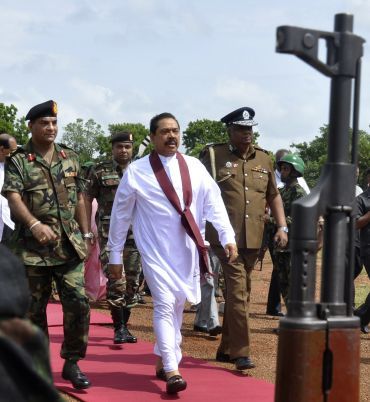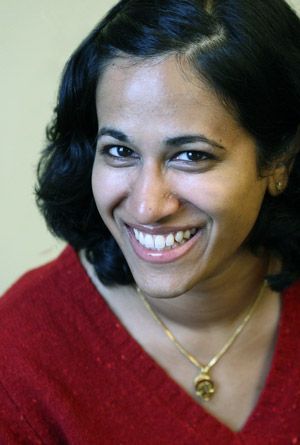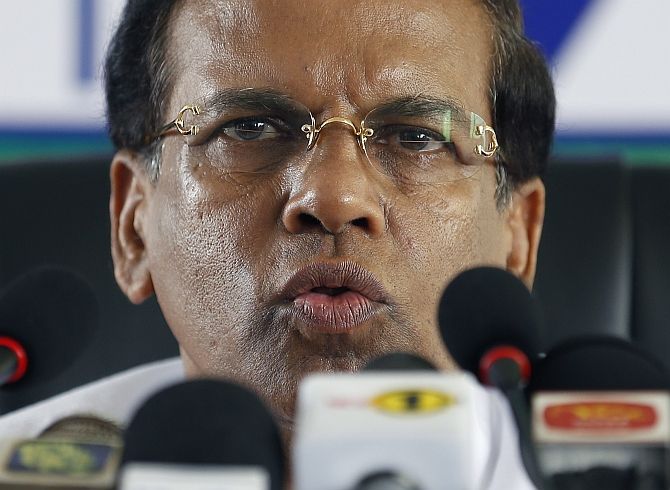'Sri Lanka has a large military presence in the north and east, where it is very difficult for the war-affected civilian population to move forward.'
'Right now the military is doing jobs that should be for the civilians. I would like to see Sirisena consider demilitarisation,' novelist V V Ganeshananthan tells Aseem Chhabra.
 The election results from Sri Lanka are still coming in, but what observers see has stunned them. Of course, no one is more stunned than President Mahinda Rajapaksa who called the election two years before his term ended. Rajapaksa has now conceded defeat to his former ally Mithripala Sirisena.
The election results from Sri Lanka are still coming in, but what observers see has stunned them. Of course, no one is more stunned than President Mahinda Rajapaksa who called the election two years before his term ended. Rajapaksa has now conceded defeat to his former ally Mithripala Sirisena.
Aseem Chhabra spoke to novelist V V Ganeshananthan, left below, about her reactions to the election results.
Ganeshananthan, an American of Sri Lankan origin and author of the 2008 novel Love Marriage, is currently on a one-year fellowship at the Radcliffe Institute for Advance Studies at Harvard University, where she is working on her second work of fiction.
Did you expect this result?
I wondered, because there was quite a lot of buzz around the Opposition candidate. I guess intellectually I knew that it was possible, but the people I am talking to, we are all in a state of disbelief.
Rajapaksa gave up fairly early, don't you think?
Sirisena is projected to win by a comfortable majority. It will not be close.
I am reading that Sirisena got a substantial Tamil and Muslim vote, but he had to have received a big support from the Sinhalese majority as well.
I don't think you can win elections in Sri Lanka on minority votes alone. Most voters are Sinhalese.
There were questions of governance that went beyond the questions of ethnicity. There are questions about the rule of law, the economy. And there was a common ground between the minorities and the Sinhalese population on these questions.
 I think it is great that people took the voting seriously. I voted in the (United States) mid-term elections here in Cambridge (Massachusetts) last year and the turnout was really low.
I think it is great that people took the voting seriously. I voted in the (United States) mid-term elections here in Cambridge (Massachusetts) last year and the turnout was really low.
It was very inspiring for me to see a lot of young people voting in Sri Lanka. I saw on my Twitter feed so many people thought their vote really counted.
One reporter tweeted a picture of a bride who stopped on her way to her wedding and voted along with her all of bridesmaids. There were many such anecdotes like that. I have friends in Sri Lanka who are reporters and they rose to the task as well.
There was a lot of concern if the incumbent loses what kind of transition will there be? Will there be election violence? And there was some election violence, but there are civil organisations that went to great length to document and monitor the violence.
Overall, it feels that things went more peacefully than people had expected. And I think that is a huge win.
But there is still fear of post-election violence. Could that happen?
Rajapaksa has conceded well in advance of the final results and Sirisena had quite a comfortable lead. I don't think people believe there was any chance of the results going the other way.
At this point there has been so much focus on the peaceful transition. So I hope not.
Rajapaksa was so confident that he called the elections two years before his term ended and how things changed so quickly.
I just searched Twitter for Rajapaksa, and people are still staying it is unbelievable, they couldn't imagine this could happen. He has been in office for nearly a decade. It's shocking, but it's a huge testament to Sri Lankan voters.
He had gotten rid of term limits. And one of the issues in this election has been the executive presidency -- the very powerful position of the president.
Under Rajapaksa those powers increased. The lines between the different branches of government, the checks and balances that exist in the US, those checks and balance have shifted in Sri Lanka.
Does democracy have to operate the same way everywhere? No. But you don't want to see someone's power go unchecked.
Sirisena was in Rajapaksa's government. People voted for someone who holds similar opinions as Rajapaksa did, but still they voted to change something.
 Where does Sirisena stand on issues about reconciliation with the Tamils and the human rights issues where the UN has been involved?
Where does Sirisena stand on issues about reconciliation with the Tamils and the human rights issues where the UN has been involved?
Observers have said that the support for Sirisena was not so much a support for Sirisena as it was opposition to Rajapaksa, at least from the perspective of the minorities.
Sirisena has said that he is not in favour of an international investigation into what happened at the end of the war. But he is in favour of a domestic mechanism.
According to a couple of profiles that have been published recently, Sirisena was the acting minster of defense at the time of the end of the war.
And the Pope is coming to Sri Lanka on January 13th.
There was some opposition to his visit before, but the Pope held the line that he was going to come. Some people felt his visit might seem to support one candidate or the other.
He is not only coming, but he is also going to a famous church in the war-affected area. He is not going to just stay in the capital area.
So do you have more hope? Sri Lanka has suffered a lot.
It was heartening to see people to vote. But one of the things I would like to see is demilitarisation since the war ended in 2009.
Sri Lanka has a large military presence in the north and east, where it is very difficult for the war-affected civilian population to move forward.
I would also like to keep pushing for what is the military's role in a successful peaceful Sri Lanka.
I don't think Sri Lanka is expecting any foreign aggression to have a large military presence.
So there is the question of why do you need a military after a civil war? Right now the military is doing jobs that should be for the civilians. I would like to see Sirisena consider demilitarisation.
Images: Top: Then President Mahinda Rajapaksa with Sri Lankan army officers in 2011.
Middle: V V Ganeshananthan.
Bottom: Sri Lankan's new President Pallewatte Gamaralalage Maithripala Yapa Sirisena.
Also Read:
Books you must Read:










